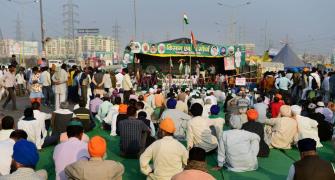Union Agriculture Minister Narendra Singh Tomar on Thursday appealed to farmer unions to end their protest and resume talks with the government on provisions of three new farm laws, but he ruled out repeal of these acts.

The minister asserted that the procurement system on the minimum support price and APMC market yards will stay and rather be strengthened.
Tomar's appeal and assurance has come amid the decision of farmer unions to intensify their strike during the monsoon session of Parliament.
"Through you, I want to appeal farmers unions to think seriously on these issues and end the protest. They should adopt the path of dialogue. And the government is ready for discussion," he said while replying to a query during a Cabinet briefing.
"There was apprehension that MSP will be scrapped. However since farmers' protest began, the procurement of foodgrans as well as pulses and oilseeds has risen," Tomar said.
The agriculture minister said the government's constant efforts are aimed at making farmers prosperous by increasing their income.
"Farm laws were a major step in this direction. I believe farmer unions should understand their benefits well in time. The entire country is understanding the benefits of these laws," Tomar said.
The minister said he has told protesting farmer unions many times that the government is ready to discuss on proposal other than repeal of the laws.
"We have always dealt with sensitivity as far as farmers' protest is concerned. The Modi government always has respect for farmers," Tomar said.
After the Cabinet decision on APMC, the unions should believe that APMC will not end, he said. "There is no such provision (to end APMC) in the laws. APMCs are set under the state laws."
Thousands of farmers, mainly from Punjab, Haryana and western Uttar Pradesh, have been camping at Delhi's borders for more than seven months in protest against the three laws that they say will end state procurement of crops at MSP.
The government and unions have held 11 rounds of talks, the last being on January 22, to break the deadlock and end the farmers'' protest. Talks have not resumed following widespread violence during a tractor rally by protesting farmers on January26.
The Supreme Court has put on hold the implementation of the three laws till further orders and set up a committee to find solutions.
Three union ministers, including Tomar and Food Minister Piyush Goyal, have held 11 rounds of talks with the protesting farmer unions.
In the last meeting on January 22, the government's negotiations with 41 farmer groups hit a roadblock as the unions squarely rejected the Centre's proposal of putting the laws on suspension.
During the 10th round of talks held on January 20, the Centre had offered to suspend the laws for 1-1.5 years and form a joint committee to find solutions, in return for protesting farmers going back to their respective homes from Delhi's borders.
The three laws -- The Farmers'' Produce Trade and Commerce (Promotion and Facilitation) Act, 2020, The Farmers (Empowerment and Protection) Agreement of Price Assurance and Farm Services Act, 2020, and The Essential Commodities (Amendment) Act 2020 -- were passed by the Parliament in September last year.
Farmer groups have alleged that these laws will end the mandi and MSP procurement systems and leave the farmers at the mercy of big corporates, even as the government has rejected these apprehensions as misplaced.
On January 11, the Supreme Court had stayed the implementation of the three laws till further orders and appointed a four-member panel to resolve the impasse. Bhartiya Kisan Union President Bhupinder Singh Mann had recused himself from the committee.
Shetkari Sanghatana (Maharashtra) President Anil Ghanwat and agriculture economists Pramod Kumar Joshi and Ashok Gulati are the other members on the panel. The panel has submitted the report to the Supreme Court.










